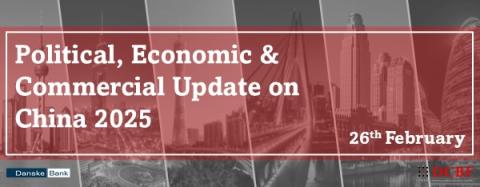
EVENTS
UPCOMING EVENTS
PAST EVENTS
RESULTS (140)

Economic, Political & Commercial Update on China 2025
Date: February 26, 2025
Time: 14:00-15:30
Event: Webinar
About the Event
Trade tensions, an intense tech race and shifting global dynamics continue to impact businesses and economies worldwide.
-
How will China respond to potential changes in U.S. policy and the global landscape?
-
Can we expect changes on the Taiwan issue?
-
What can companies anticipate for China’s policy agenda and economic outlook in 2025?
-
What trade-offs might occurs from siloing and diversification efforts for foreign businesses in China?
Understanding these shifts is essential for businesses looking to navigate the complexities of the Chinese market and its broader global impact.
Join us for this Signature Webinar, where our most esteemed speakers will provide key insights into business, economic trends, and geopolitical developments shaping China in the coming year.

"Dealing with Trump 2.0" - is China making tactical or strategic adjustments in view of the 15th Five-Year-Plan?
Date: February 26, 2025
Time: 9:00-9:45 CET 16:00-16:45 CST
Event: Supported Webinar
This webinar is part of the webinar series 'Staying in Dialogue with China'. The series will bring you six webinars with distinguished China-based experts, concentrated between February and December 2025.
'Staying in Dialogue with China' is organized and hosted by China Macro Group (CMG), with Caixin Global as Anchor Partner, in cooperation with the China Europe International Business School (CEIBS), Chinaforum Bayern, Swissmem, the Norwegian Business Association China (NBA China), the Danish-Chinese Business Forum (DCBF) and the Sweden-China Trade Council (SCTC).
The first webinar of the 2025 edition of the “Staying in Dialogue with China” webinar series is dedicated to the theme of China’s next and upcoming 15th Five-Year-Plan (2026-2030). Markus Hermann Chen, Co-Founder and Managing Director of CMG, will talk to Prof. Da Wei, Director of the Center for International Security and Strategy (CISS) and Professor of International Relations at Tsinghua University in Beijing.
Key themes to discuss with Prof. Da include:
- US-China interactions since Trump’s election and how Beijing sees Trump 2.0
- China’s response to deal with Trump 2.0 strategically – domestically and in foreign affairs
- Collaboration in helping to mediate in and settle Russia’s war with Ukraine
- Possibility of strategic US-China dealmaking, and what are the respective “gives”
- Likely key political topics poised to bring continued or new frictions in bilateral relationship
- Contours of the future US-China trade relationship and tech competition
- Compatibility of “Make America great again” with China’s idea of national rejuvenation
Take the opportunity to listen in and ask your questions to Prof. Da.
Members of DCBF can register for free - Click here to read more and sign up!

"Domestic Demand System"
Date: December 10, 2024
Time: 09:00-09:45 am (DK) / 03:00-03:45 pm (CN)
Event: Supported Webinar
This webinar is part of the webinar series 'Staying in Dialogue with China'. The series will bring you six webinars with distinguished China-based experts, concentrated between April and December 2024.
'Staying in Dialogue with China' is organized and hosted by China Macro Group (CMG), with Caixin Global as Anchor Partner, in cooperation with the China Europe International Business School (CEIBS), Chinaforum Bayern, Swissmem, the Swiss Chinese Chamber of Commerce (SCCC), the Danish-Chinese Business Forum (DCBF), SwissCham China, the Stein am Rhein Symposium (stars), and the Sweden-China Trade Council (SCTC).
In the sixth and last session of the 2024 webinar series "Staying in Dialogue with China", Markus Hermann, Co-Founder and Managing Director, China Macro Group (CMG) will be talking to Prof. Xu Qiyuan, Deputy Director, Institute of Wolrd Economics and Politics (IWEP) at the Chinese Academy of Social Sciences (CASS), about China's "Domestic Demand System" as the sixth structural transition as per CMG's conceptual framework of China's political economy.
The topic of “domestic demand system” refers to China’s attempt to pivot to more consumption-oriented economic growth, while reducing its reliance on fixed asset investments and the trade surplus – a legacy from Beijing’s export-oriented growth model. China should rely more on domestic demand to drive economic growth, thus, in a state of an overall elevated level of marketization, household consumption should shape supply of services and production more strongly.
Against the backdrop of the Covid pandemic, it remained unclear how much policy emphasis would be placed on the building of “domestic demand system”. In China’s short-term policy goals over the past five years, the “demand side” received primary policy focus only once, during the Central Economic Work Conference (CEWC) in 2022, whereas the three preceding years as well as the 2023 CEWC all consistently prioritized the “supply side”, or the goal of achieving the so-called “modernized industrial system” over the “demand side”.
Notably, the new reform plan released during the latest Third Plenum also placed “domestic demand system” at a strategically lower position than the supply side. Nonetheless, it should not be ignored that the State Council published a comprehensive blueprint for “Domestic Demand Expansion Strategy” in December 2022, unifying diverse policy areas ranging from trade, to digital and urbanization into one overarching framework.
The bottom-line is that among the six structural transitions, CMG’s assessment concludes that the “domestic demand system” has seen comparatively least progress compared to the 18th Central Committee’s Third Plenum in 2013, as evidenced by the still very low household consumption as share of GDP of about 40% only.
Key questions CMG want to discuss with Prof. Xu in this coming webinar include:
- What exactly is a "domestic demand system" in the thinking of Chinese policymakers?
- How are "supply" vs "demand" side each seen strategically by the Chinese leadership?
- Are there structural levers or quick-wins to unleash more domestic demand to urgently and effectively revitalize the economy?
- What is the role of China's social security system to help unleash the domestic demand?
- What is the link between demand boost and "common prosperity"?
Members of DCBF can register for free - Click here to read more and sign up!

CBAM and its Impact on Nordic Companies in China
Date: November 25, 2024
Time: (Online) 9am - 10am (DK) / 4pm – 5pm (CN)
(In-person) 1:45 pm - 7 pm (CN)
Event: Webinar
Join us for an essential discussion on the European Union's Carbon Border Adjustment Mechanism (CBAM) and its significant implications for businesses across the globe, with a specific focus on the impact on Danish and Chinese Companies. This webinar is invaluable for businesses exporting to the EU, particularly those in sectors such as steel, iron, aluminum, and fertilizers, all of which which will be required to comply with CBAM's demanding new reporting and financial obligations by 2026.
Key Takeaways:
- Trade Risks: Discover the challenges faced by China-based exporters navigating this complex regulatory framework.
- Mitigation Strategies: Learn about proactive measures companies can take to align with both local and EU-level regulations, minimizing disruptions.
- Practical Solutions: Gain actionable insights into carbon emissions monitoring, data exchanges with EU importers, and how to improve energy efficiency to reduce financial impacts.
Secure your spot today by clicking here (online participation) to stay ahead of this vital transition. (For DCBF, DCCC, DCCHK, NBA China, SwedCham China and FinnCham China members only).
Speakers
Gain insights from Morten Højberg, Enviromental Economist at the Danish Energy Agency; and Sune Kåre Sørensen, Climate and Energy Attaché at the Embassy of the Kingdom of Denmark in China, as they share updates on CBAM regulations and key developments from COP29, equipping you to navigate this complex regulatory landscape with confidence.
Possibility for In-person Participation in Ningbo, Zhejiang
In-person participation will be available for this event, as the webinar will be part of an event hosted by Hoyer Motors Asia in Ningbo, Zhejiang.
The agenda for the in-person event will be as follows:
- 1:45 pm – 2:00 pm | Registration and Welcome
- 2:00 pm – 3:45 pm | Introduction and Guided Site Tour
- 4:00 pm – 5:00 pm | CBAM Overview by Morten Højberg (Hybrid Webinar)
- 5:00 pm – 6:00 pm | State of the Union Update and Q&A with Consul General Mikael Hemniti Winther
- 6:00 pm – 7:00 pm | Networking Reception
For registration and further information about the physical event, please click here.
About CBAM
Since October 1st 2023, CBAM requires EU importers to report emissions for select goods. More stringent financial measures will take effect by 2026. Is your company prepared for this shift? Now is the time to understand and act.
Don't miss this chance to prepare your business for compliance.

Intercultural Communicative Competence in Doing Business with China
Date: October 30, 2024
Time: 9:00-10:00 a.m. (DK) / 4:00 – 5:00 p.m. (CN)
Event: Webinar
In the globalized business landscape, effective communication across cultural boundaries is pivotal, especially considering China's significant role in the global economy. Join us for this webinar session, which delves into the critical aspects of intercultural communicative competence required for successful business interactions with Chinese counterparts.
Dr. Catherine Hua Xiang unravels the nuances of effective communication in China. Her new book, 'Bridging the Gap', equips readers with the understanding needed to navigate cultural differences, making their cross-cultural interactions more successful and rewarding.
Gain crucial insights into:
- An illustrative anecdote highlighting the subtleties and challenges of cross-cultural communication, setting the stage for an in-depth examination of various applied linguistics theories and strategies.
- Intercultural Communicative Competence: Understand how to bridge cultural and communicative gaps with China.
- Linguistic Theories in Practice such as Cooperative Communicative Competence, Linguistic Politeness Theory, Communicative Accommodation Theory, Rapport Management Theory, Conversational Involvement Strategies, and the SPEAKING Model.
- Building Rapport and Engaging with Chinese Business Culture: Learn techniques for effective context understanding and deeper engagement.
- Cultural Values in Language: Discover how language reflects cultural values and impacts business practices in China.
This essential webinar will enhance your ability to communicate and do business effectively in China. Gain the knowledge and tools needed to foster successful cross-cultural business relationships.
Click here to register (for DCBF, DCCC and DCCHK members only).
Speaker
Dr. Catherine Xiang is an established author and applied linguist with extensive experience in higher education and high-profile consultancy for businesses engaging with China. Originally from Shanghai, she is skilled in intercultural communication, translation, foreign languages, and public speaking. She serves as Head of East Asian Languages and Programme Director for BSc International Relations and Chinese at LSE, as well as UK Director for the LSE Confucius Institute for Business. Recognized with multiple LSE Education Excellence Awards and the title of 'LSE Education Innovator,' she developed LSE's first Edex course on workplace intercultural communication.
Beyond LSE, Dr. Xiang is an executive member of the British Chinese Language Teaching Society, a school governor, and Chief Examiner of the Diploma in Translation at the Chartered Institute of Linguists. Her publications include Mastering Chinese, Audiovisual Media in Language Education, China Ready, and the recent Bridging the Gap. During the pandemic, she launched the YouTube channel "字 espresso," exploring Chinese characters and words.

Economic Globalization
Date: October 23, 2024
Time: 09:00-09:45 am (DK) / 03:00-03:45 pm (CN)
Event: Supported Webinar
This webinar is part of the webinar series 'Staying in Dialogue with China'. The series will bring you six webinars with distinguished China-based experts, concentrated between April and October 2024.
'Staying in Dialogue with China' is organized and hosted by China Macro Group (CMG), with Caixin Global as Anchor Partner, in cooperation with the China Europe International Business School (CEIBS), Chinaforum Bayern, Swissmem, the Swiss Chinese Chamber of Commerce (SCCC), the Danish-Chinese Business Forum (DCBF), SwissCham China, the Stein am Rhein Symposium (stars), and the Sweden-China Trade Council (SCTC).
In the fifth session of the webinar series "Staying in Dialogue with China", Markus Hermann, Co-Founder and Managing Director, China Macro Group (CMG) will be talking to Prof. Yu Miaojie, President & University Chair of Liaoning University, and Liberal-Art Chair Professor of Peking University about China's "Economic Globalization" as a fifth structural transition as per CMG's conceptual framework of China's political economy.
China in the 1980s embarked on a gradual and selective path of opening up its by then closed economy to the world - understanding that foreign investment and technologies were critical to the country's catch-up development. In the years that followed, most notably after China acceded the WTO in 2001, the Chinese economy rapidly integrated with the world across trade and investment and started its climb in global value chains. At the same time, foreign investment flocked to China to make use of a skilled and comparatively cheap workforce, and in later days increasingly of a highly competitive and dynamic manufacturing and innovation ecosystem. A classic win-win situation.
Around 2015 (publication of "Made in China 2025"), and especially 2016 with the election of US-president Trump, however, the US and increasingly also the EU and other countries started pushing back against China's export-oriented development model that had run large annual trade surpluses and become a significant economic player and competitor internationally in a number of industries. China, in turn, with the 14th Five-Year Plan (2021-2025) unveiled its 'dual circulation' strategy to respond to a more complex global environment - among others in an attempt to make its own economy less dependent on external inputs and strengthen its overall resilience.
To date, the global economic integration has brought great benefits to China, but amid an altered geoeconomic and geopolitical context, how will top-level policymaking evolve? What does Beijing mean with "high-level opening up"? What are policy and market trends for the continues "going out" of Chinese companies? What will Beijing do about the issue of "overcapacity" invoked by many Western governments, as well as its structurally large trade imbalance? In view of some new trade policy measured of the Third Plenum, will we see a stronger trade diversion targeting the Global South? What importance do policymakers still assign to FDI and is it in China's interest to provide a better level playing field domestically? How is China's financial integration with the world going to evolve? What role shall and can the RMB play in all this?
Members of DCBF can register for free - Click here to read more and sign up!

Intellectual Property in a Brave New Digital World: A Primer for SMEs
Date: October 17, 2024
Time: 9:00-11:00 am (DK) / 3:00-5:00 pm (CN)
Event: Supported Webinar
Do you want to learn more about the evolving landscape of intellectual property (IP) protection in the software industry?
As Danish companies increasingly engage with China-compliant software solutions, navigating the complex regulatory environment surrounding digital IP and data protection is crucial. In DCBF’s recent position paper ‘Survey Among Danish Companies in China 2024’, IP protection yet again proved to be an ever-important area of concern among Danish companies in China. Therefore, DCBF cordially extends an invitation to our members to join the EU SME Centre, the IP SME Helpdesk and the European Union Chamber of Commerce in China’s Working Group meeting on digital IP protection, to gain important insights on software licensing in China.
About the Workshop:
During this training, Ms Lisa Lu, China IP SME Helpdesk IP Business Advisor, will discuss the importance of IP protection in the software industry and will cover the different types of IP used to protect software, including but not limited to copyright, patents and trade secrets.
Mr Charles Feng, Director of the International Business Department and a Senior Partner of Tahota (Beijing) Law Firm will cover data privacy and IP.
Furthermore, Mr Phillip Neumann, Business Development Manager at AppinChina, will provide practical information on relevant processes and best practices for companies in areas such as software licensing. Before and after the presentation, there will be a short quiz to assess the impact of the seminar. The quiz is anonymous.
Join this workshop on October 17th, in Beijing and online, where industry experts will highlight the significance of IP protection for software, discuss various IP types as well as best practices to get your company up-to-date guidance in adherence to Chinese regulations.

Social Rebalancing
Date: September 11, 2024
Time: 09:00-09:45 am (DK) / 03:00-03:45 pm (CN)
Event: Supported Webinar
This webinar is part of the webinar series 'Staying in Dialogue with China'. The series will bring you six webinars with distinguished China-based experts, concentrated between April and October 2024.
'Staying in Dialogue with China' is organized and hosted by China Macro Group (CMG), with Caixin Global as Anchor Partner, in cooperation with the China Europe International Business School (CEIBS), Chinaforum Bayern, Swissmem, the Swiss Chinese Chamber of Commerce (SCCC), the Danish-Chinese Business Forum (DCBF), SwissCham China, the Stein am Rhein Symposium (stars), and the Sweden-China Trade Council (SCTC).
In the fourth session of the webinar series "Staying in Dialogue with China", Markus Hermann, Co-Founder and Managing Director, China Macro Group (CMG) will be talking to Prof. Li Shi, Dean of the Institute for Common Prosperity and Development at Zhejiang University about China's "Social Rebalancing" as a fourth structural transition as per CMG's conceptual framework of China's political economy.
Institutional reforms kick-started in 1978 enabled China's rapid catch-up. These reforms, however, were applied selectively and thus the development has been heavily skewed towards China's coastal areas. So, despite officially having eradicated absolute poverty in 2021, the Gini coefficient for the country's income distribution still stands at 0.467 (2022), much higher than the average .stands at 0.35 average in Asia.
In 2020, the late premier Li Keqiang reminded everybody that China still has 600 million people living on a monthly income of 1,000 yuan (US$140), "barely enough to cover monthly rent in a mid-sized Chinese City". President Xi likewise conceded that "unbalanced and inadequate development remains a pronounced problem". Problems are thus manifold: domestic household consumption remains structurally subdued, migrant workers still don't enjoy the same public services as regular urban residents do, and birth rates have been falling rapidly - also due to higher costs of living.
Coming out of the Third Plenum, the mid-year July Politburo meeting as well as the Beidaihe leadership conclave, what are Beijing's - possibly readjusted - policy priorities and recipes to address these social policy challenges? How has "Common Prosperity" already become a policy reality? What are first learnings from its polit on Zhejiang province? How will China's lower-class workers be protected, allowed to unionize and taxed in the future? How can social rebalancing contribute to long-term goals such as stimulating consumption and reviving birth rates?
Members of DCBF can register for free - Click here to read more and sign up!

Sourcing Survey Report 2024 - From Global to Regional
Date: September 03, 2024
Time: 11:00-12:00 a.m. (DK) / 5:00 – 6:00 p.m. (CN)
Event: Webinar
ARC Consulting will present their latest findings in the "Sourcing Survey Report 2024 - From Global to Regional." This report provides an analysis of how businesses are adapting their sourcing strategies in response to recent global challenges. The webinar will focus on the shift from global to regional sourcing and examine the impact of disruptions in logistics and supply chains.
Key Discussion Topics:
- Current Sourcing Trends: Examine the state of sourcing in China, Southeast Asia, and Europe.
- Post-Pandemic and Geopolitical Effects: Understand how sourcing strategies are evolving amid ongoing challenges.
- Supply Chain Diversification: Explore strategies for diversifying supply chain to mitigate future risks.
- Emerging Sourcing Destinations: Identify potential alternatives to China as a top sourcing hub.
- Sustainability Considerations: Discuss the increasing demand for sustainability in supply chain.
- ESG Challenges: Assess the impact of ESG-related costs and risks on sustainable growth strategies.
Join us for this webinar with Johan Annell, Partner and General Manager for ARC Consulting, who will present the key findings of this year's report. Discover key trends that can enhance your company's strategy through CSR monitoring.
Click here to register (for DCBF, DCCC and DCCHK members only).
Speaker
Johan Annell is a Partner and the General Manager for ARC Consulting, leading their Beijing office. His expertise includes strategy, M&A business transformation, supply chain management, and manufacturing. Johan has significant experience working with large companies in China and specializes in the automotive sector, industrial equipment, advanced manufacturing, and industrial IT. He holds M.Sc. degrees in Industrial Engineering & Management and Financial Economics and is fluent in Mandarin.
 Back
Back

Economic, Political & Commercial Update on China 2025
Date: February 26, 2025
Event: Webinar
About the Event
Trade tensions, an intense tech race and shifting global dynamics continue to impact businesses and economies worldwide.
-
How will China respond to potential changes in U.S. policy and the global landscape?
-
Can we expect changes on the Taiwan issue?
-
What can companies anticipate for China’s policy agenda and economic outlook in 2025?
-
What trade-offs might occurs from siloing and diversification efforts for foreign businesses in China?
Understanding these shifts is essential for businesses looking to navigate the complexities of the Chinese market and its broader global impact.
Join us for this Signature Webinar, where our most esteemed speakers will provide key insights into business, economic trends, and geopolitical developments shaping China in the coming year.
 Back
Back

"Dealing with Trump 2.0" - is China making tactical or strategic adjustments in view of the 15th Five-Year-Plan?
Date: February 26, 2025
Event: Supported Webinar
This webinar is part of the webinar series 'Staying in Dialogue with China'. The series will bring you six webinars with distinguished China-based experts, concentrated between February and December 2025.
'Staying in Dialogue with China' is organized and hosted by China Macro Group (CMG), with Caixin Global as Anchor Partner, in cooperation with the China Europe International Business School (CEIBS), Chinaforum Bayern, Swissmem, the Norwegian Business Association China (NBA China), the Danish-Chinese Business Forum (DCBF) and the Sweden-China Trade Council (SCTC).
The first webinar of the 2025 edition of the “Staying in Dialogue with China” webinar series is dedicated to the theme of China’s next and upcoming 15th Five-Year-Plan (2026-2030). Markus Hermann Chen, Co-Founder and Managing Director of CMG, will talk to Prof. Da Wei, Director of the Center for International Security and Strategy (CISS) and Professor of International Relations at Tsinghua University in Beijing.
Key themes to discuss with Prof. Da include:
- US-China interactions since Trump’s election and how Beijing sees Trump 2.0
- China’s response to deal with Trump 2.0 strategically – domestically and in foreign affairs
- Collaboration in helping to mediate in and settle Russia’s war with Ukraine
- Possibility of strategic US-China dealmaking, and what are the respective “gives”
- Likely key political topics poised to bring continued or new frictions in bilateral relationship
- Contours of the future US-China trade relationship and tech competition
- Compatibility of “Make America great again” with China’s idea of national rejuvenation
Take the opportunity to listen in and ask your questions to Prof. Da.
Members of DCBF can register for free - Click here to read more and sign up!
 Back
Back

"Domestic Demand System"
Date: December 10, 2024
Event: Supported Webinar
This webinar is part of the webinar series 'Staying in Dialogue with China'. The series will bring you six webinars with distinguished China-based experts, concentrated between April and December 2024.
'Staying in Dialogue with China' is organized and hosted by China Macro Group (CMG), with Caixin Global as Anchor Partner, in cooperation with the China Europe International Business School (CEIBS), Chinaforum Bayern, Swissmem, the Swiss Chinese Chamber of Commerce (SCCC), the Danish-Chinese Business Forum (DCBF), SwissCham China, the Stein am Rhein Symposium (stars), and the Sweden-China Trade Council (SCTC).
In the sixth and last session of the 2024 webinar series "Staying in Dialogue with China", Markus Hermann, Co-Founder and Managing Director, China Macro Group (CMG) will be talking to Prof. Xu Qiyuan, Deputy Director, Institute of Wolrd Economics and Politics (IWEP) at the Chinese Academy of Social Sciences (CASS), about China's "Domestic Demand System" as the sixth structural transition as per CMG's conceptual framework of China's political economy.
The topic of “domestic demand system” refers to China’s attempt to pivot to more consumption-oriented economic growth, while reducing its reliance on fixed asset investments and the trade surplus – a legacy from Beijing’s export-oriented growth model. China should rely more on domestic demand to drive economic growth, thus, in a state of an overall elevated level of marketization, household consumption should shape supply of services and production more strongly.
Against the backdrop of the Covid pandemic, it remained unclear how much policy emphasis would be placed on the building of “domestic demand system”. In China’s short-term policy goals over the past five years, the “demand side” received primary policy focus only once, during the Central Economic Work Conference (CEWC) in 2022, whereas the three preceding years as well as the 2023 CEWC all consistently prioritized the “supply side”, or the goal of achieving the so-called “modernized industrial system” over the “demand side”.
Notably, the new reform plan released during the latest Third Plenum also placed “domestic demand system” at a strategically lower position than the supply side. Nonetheless, it should not be ignored that the State Council published a comprehensive blueprint for “Domestic Demand Expansion Strategy” in December 2022, unifying diverse policy areas ranging from trade, to digital and urbanization into one overarching framework.
The bottom-line is that among the six structural transitions, CMG’s assessment concludes that the “domestic demand system” has seen comparatively least progress compared to the 18th Central Committee’s Third Plenum in 2013, as evidenced by the still very low household consumption as share of GDP of about 40% only.
Key questions CMG want to discuss with Prof. Xu in this coming webinar include:
- What exactly is a "domestic demand system" in the thinking of Chinese policymakers?
- How are "supply" vs "demand" side each seen strategically by the Chinese leadership?
- Are there structural levers or quick-wins to unleash more domestic demand to urgently and effectively revitalize the economy?
- What is the role of China's social security system to help unleash the domestic demand?
- What is the link between demand boost and "common prosperity"?
Members of DCBF can register for free - Click here to read more and sign up!
 Back
Back

CBAM and its Impact on Nordic Companies in China
Date: November 25, 2024
Event: Webinar
Join us for an essential discussion on the European Union's Carbon Border Adjustment Mechanism (CBAM) and its significant implications for businesses across the globe, with a specific focus on the impact on Danish and Chinese Companies. This webinar is invaluable for businesses exporting to the EU, particularly those in sectors such as steel, iron, aluminum, and fertilizers, all of which which will be required to comply with CBAM's demanding new reporting and financial obligations by 2026.
Key Takeaways:
- Trade Risks: Discover the challenges faced by China-based exporters navigating this complex regulatory framework.
- Mitigation Strategies: Learn about proactive measures companies can take to align with both local and EU-level regulations, minimizing disruptions.
- Practical Solutions: Gain actionable insights into carbon emissions monitoring, data exchanges with EU importers, and how to improve energy efficiency to reduce financial impacts.
Secure your spot today by clicking here (online participation) to stay ahead of this vital transition. (For DCBF, DCCC, DCCHK, NBA China, SwedCham China and FinnCham China members only).
Speakers
Gain insights from Morten Højberg, Enviromental Economist at the Danish Energy Agency; and Sune Kåre Sørensen, Climate and Energy Attaché at the Embassy of the Kingdom of Denmark in China, as they share updates on CBAM regulations and key developments from COP29, equipping you to navigate this complex regulatory landscape with confidence.
Possibility for In-person Participation in Ningbo, Zhejiang
In-person participation will be available for this event, as the webinar will be part of an event hosted by Hoyer Motors Asia in Ningbo, Zhejiang.
The agenda for the in-person event will be as follows:
- 1:45 pm – 2:00 pm | Registration and Welcome
- 2:00 pm – 3:45 pm | Introduction and Guided Site Tour
- 4:00 pm – 5:00 pm | CBAM Overview by Morten Højberg (Hybrid Webinar)
- 5:00 pm – 6:00 pm | State of the Union Update and Q&A with Consul General Mikael Hemniti Winther
- 6:00 pm – 7:00 pm | Networking Reception
For registration and further information about the physical event, please click here.
About CBAM
Since October 1st 2023, CBAM requires EU importers to report emissions for select goods. More stringent financial measures will take effect by 2026. Is your company prepared for this shift? Now is the time to understand and act.
Don't miss this chance to prepare your business for compliance.
 Back
Back

Intercultural Communicative Competence in Doing Business with China
Date: October 30, 2024
Event: Webinar
In the globalized business landscape, effective communication across cultural boundaries is pivotal, especially considering China's significant role in the global economy. Join us for this webinar session, which delves into the critical aspects of intercultural communicative competence required for successful business interactions with Chinese counterparts.
Dr. Catherine Hua Xiang unravels the nuances of effective communication in China. Her new book, 'Bridging the Gap', equips readers with the understanding needed to navigate cultural differences, making their cross-cultural interactions more successful and rewarding.
Gain crucial insights into:
- An illustrative anecdote highlighting the subtleties and challenges of cross-cultural communication, setting the stage for an in-depth examination of various applied linguistics theories and strategies.
- Intercultural Communicative Competence: Understand how to bridge cultural and communicative gaps with China.
- Linguistic Theories in Practice such as Cooperative Communicative Competence, Linguistic Politeness Theory, Communicative Accommodation Theory, Rapport Management Theory, Conversational Involvement Strategies, and the SPEAKING Model.
- Building Rapport and Engaging with Chinese Business Culture: Learn techniques for effective context understanding and deeper engagement.
- Cultural Values in Language: Discover how language reflects cultural values and impacts business practices in China.
This essential webinar will enhance your ability to communicate and do business effectively in China. Gain the knowledge and tools needed to foster successful cross-cultural business relationships.
Click here to register (for DCBF, DCCC and DCCHK members only).
Speaker
Dr. Catherine Xiang is an established author and applied linguist with extensive experience in higher education and high-profile consultancy for businesses engaging with China. Originally from Shanghai, she is skilled in intercultural communication, translation, foreign languages, and public speaking. She serves as Head of East Asian Languages and Programme Director for BSc International Relations and Chinese at LSE, as well as UK Director for the LSE Confucius Institute for Business. Recognized with multiple LSE Education Excellence Awards and the title of 'LSE Education Innovator,' she developed LSE's first Edex course on workplace intercultural communication.
Beyond LSE, Dr. Xiang is an executive member of the British Chinese Language Teaching Society, a school governor, and Chief Examiner of the Diploma in Translation at the Chartered Institute of Linguists. Her publications include Mastering Chinese, Audiovisual Media in Language Education, China Ready, and the recent Bridging the Gap. During the pandemic, she launched the YouTube channel "字 espresso," exploring Chinese characters and words.
 Back
Back

Economic Globalization
Date: October 23, 2024
Event: Supported Webinar
This webinar is part of the webinar series 'Staying in Dialogue with China'. The series will bring you six webinars with distinguished China-based experts, concentrated between April and October 2024.
'Staying in Dialogue with China' is organized and hosted by China Macro Group (CMG), with Caixin Global as Anchor Partner, in cooperation with the China Europe International Business School (CEIBS), Chinaforum Bayern, Swissmem, the Swiss Chinese Chamber of Commerce (SCCC), the Danish-Chinese Business Forum (DCBF), SwissCham China, the Stein am Rhein Symposium (stars), and the Sweden-China Trade Council (SCTC).
In the fifth session of the webinar series "Staying in Dialogue with China", Markus Hermann, Co-Founder and Managing Director, China Macro Group (CMG) will be talking to Prof. Yu Miaojie, President & University Chair of Liaoning University, and Liberal-Art Chair Professor of Peking University about China's "Economic Globalization" as a fifth structural transition as per CMG's conceptual framework of China's political economy.
China in the 1980s embarked on a gradual and selective path of opening up its by then closed economy to the world - understanding that foreign investment and technologies were critical to the country's catch-up development. In the years that followed, most notably after China acceded the WTO in 2001, the Chinese economy rapidly integrated with the world across trade and investment and started its climb in global value chains. At the same time, foreign investment flocked to China to make use of a skilled and comparatively cheap workforce, and in later days increasingly of a highly competitive and dynamic manufacturing and innovation ecosystem. A classic win-win situation.
Around 2015 (publication of "Made in China 2025"), and especially 2016 with the election of US-president Trump, however, the US and increasingly also the EU and other countries started pushing back against China's export-oriented development model that had run large annual trade surpluses and become a significant economic player and competitor internationally in a number of industries. China, in turn, with the 14th Five-Year Plan (2021-2025) unveiled its 'dual circulation' strategy to respond to a more complex global environment - among others in an attempt to make its own economy less dependent on external inputs and strengthen its overall resilience.
To date, the global economic integration has brought great benefits to China, but amid an altered geoeconomic and geopolitical context, how will top-level policymaking evolve? What does Beijing mean with "high-level opening up"? What are policy and market trends for the continues "going out" of Chinese companies? What will Beijing do about the issue of "overcapacity" invoked by many Western governments, as well as its structurally large trade imbalance? In view of some new trade policy measured of the Third Plenum, will we see a stronger trade diversion targeting the Global South? What importance do policymakers still assign to FDI and is it in China's interest to provide a better level playing field domestically? How is China's financial integration with the world going to evolve? What role shall and can the RMB play in all this?
Members of DCBF can register for free - Click here to read more and sign up!
 Back
Back

Intellectual Property in a Brave New Digital World: A Primer for SMEs
Date: October 17, 2024
Event: Supported Webinar
Do you want to learn more about the evolving landscape of intellectual property (IP) protection in the software industry?
As Danish companies increasingly engage with China-compliant software solutions, navigating the complex regulatory environment surrounding digital IP and data protection is crucial. In DCBF’s recent position paper ‘Survey Among Danish Companies in China 2024’, IP protection yet again proved to be an ever-important area of concern among Danish companies in China. Therefore, DCBF cordially extends an invitation to our members to join the EU SME Centre, the IP SME Helpdesk and the European Union Chamber of Commerce in China’s Working Group meeting on digital IP protection, to gain important insights on software licensing in China.
About the Workshop:
During this training, Ms Lisa Lu, China IP SME Helpdesk IP Business Advisor, will discuss the importance of IP protection in the software industry and will cover the different types of IP used to protect software, including but not limited to copyright, patents and trade secrets.
Mr Charles Feng, Director of the International Business Department and a Senior Partner of Tahota (Beijing) Law Firm will cover data privacy and IP.
Furthermore, Mr Phillip Neumann, Business Development Manager at AppinChina, will provide practical information on relevant processes and best practices for companies in areas such as software licensing. Before and after the presentation, there will be a short quiz to assess the impact of the seminar. The quiz is anonymous.
Join this workshop on October 17th, in Beijing and online, where industry experts will highlight the significance of IP protection for software, discuss various IP types as well as best practices to get your company up-to-date guidance in adherence to Chinese regulations.
 Back
Back

Social Rebalancing
Date: September 11, 2024
Event: Supported Webinar
This webinar is part of the webinar series 'Staying in Dialogue with China'. The series will bring you six webinars with distinguished China-based experts, concentrated between April and October 2024.
'Staying in Dialogue with China' is organized and hosted by China Macro Group (CMG), with Caixin Global as Anchor Partner, in cooperation with the China Europe International Business School (CEIBS), Chinaforum Bayern, Swissmem, the Swiss Chinese Chamber of Commerce (SCCC), the Danish-Chinese Business Forum (DCBF), SwissCham China, the Stein am Rhein Symposium (stars), and the Sweden-China Trade Council (SCTC).
In the fourth session of the webinar series "Staying in Dialogue with China", Markus Hermann, Co-Founder and Managing Director, China Macro Group (CMG) will be talking to Prof. Li Shi, Dean of the Institute for Common Prosperity and Development at Zhejiang University about China's "Social Rebalancing" as a fourth structural transition as per CMG's conceptual framework of China's political economy.
Institutional reforms kick-started in 1978 enabled China's rapid catch-up. These reforms, however, were applied selectively and thus the development has been heavily skewed towards China's coastal areas. So, despite officially having eradicated absolute poverty in 2021, the Gini coefficient for the country's income distribution still stands at 0.467 (2022), much higher than the average .stands at 0.35 average in Asia.
In 2020, the late premier Li Keqiang reminded everybody that China still has 600 million people living on a monthly income of 1,000 yuan (US$140), "barely enough to cover monthly rent in a mid-sized Chinese City". President Xi likewise conceded that "unbalanced and inadequate development remains a pronounced problem". Problems are thus manifold: domestic household consumption remains structurally subdued, migrant workers still don't enjoy the same public services as regular urban residents do, and birth rates have been falling rapidly - also due to higher costs of living.
Coming out of the Third Plenum, the mid-year July Politburo meeting as well as the Beidaihe leadership conclave, what are Beijing's - possibly readjusted - policy priorities and recipes to address these social policy challenges? How has "Common Prosperity" already become a policy reality? What are first learnings from its polit on Zhejiang province? How will China's lower-class workers be protected, allowed to unionize and taxed in the future? How can social rebalancing contribute to long-term goals such as stimulating consumption and reviving birth rates?
Members of DCBF can register for free - Click here to read more and sign up!
 Back
Back

Sourcing Survey Report 2024 - From Global to Regional
Date: September 03, 2024
Event: Webinar
ARC Consulting will present their latest findings in the "Sourcing Survey Report 2024 - From Global to Regional." This report provides an analysis of how businesses are adapting their sourcing strategies in response to recent global challenges. The webinar will focus on the shift from global to regional sourcing and examine the impact of disruptions in logistics and supply chains.
Key Discussion Topics:
- Current Sourcing Trends: Examine the state of sourcing in China, Southeast Asia, and Europe.
- Post-Pandemic and Geopolitical Effects: Understand how sourcing strategies are evolving amid ongoing challenges.
- Supply Chain Diversification: Explore strategies for diversifying supply chain to mitigate future risks.
- Emerging Sourcing Destinations: Identify potential alternatives to China as a top sourcing hub.
- Sustainability Considerations: Discuss the increasing demand for sustainability in supply chain.
- ESG Challenges: Assess the impact of ESG-related costs and risks on sustainable growth strategies.
Join us for this webinar with Johan Annell, Partner and General Manager for ARC Consulting, who will present the key findings of this year's report. Discover key trends that can enhance your company's strategy through CSR monitoring.
Click here to register (for DCBF, DCCC and DCCHK members only).
Speaker
Johan Annell is a Partner and the General Manager for ARC Consulting, leading their Beijing office. His expertise includes strategy, M&A business transformation, supply chain management, and manufacturing. Johan has significant experience working with large companies in China and specializes in the automotive sector, industrial equipment, advanced manufacturing, and industrial IT. He holds M.Sc. degrees in Industrial Engineering & Management and Financial Economics and is fluent in Mandarin.